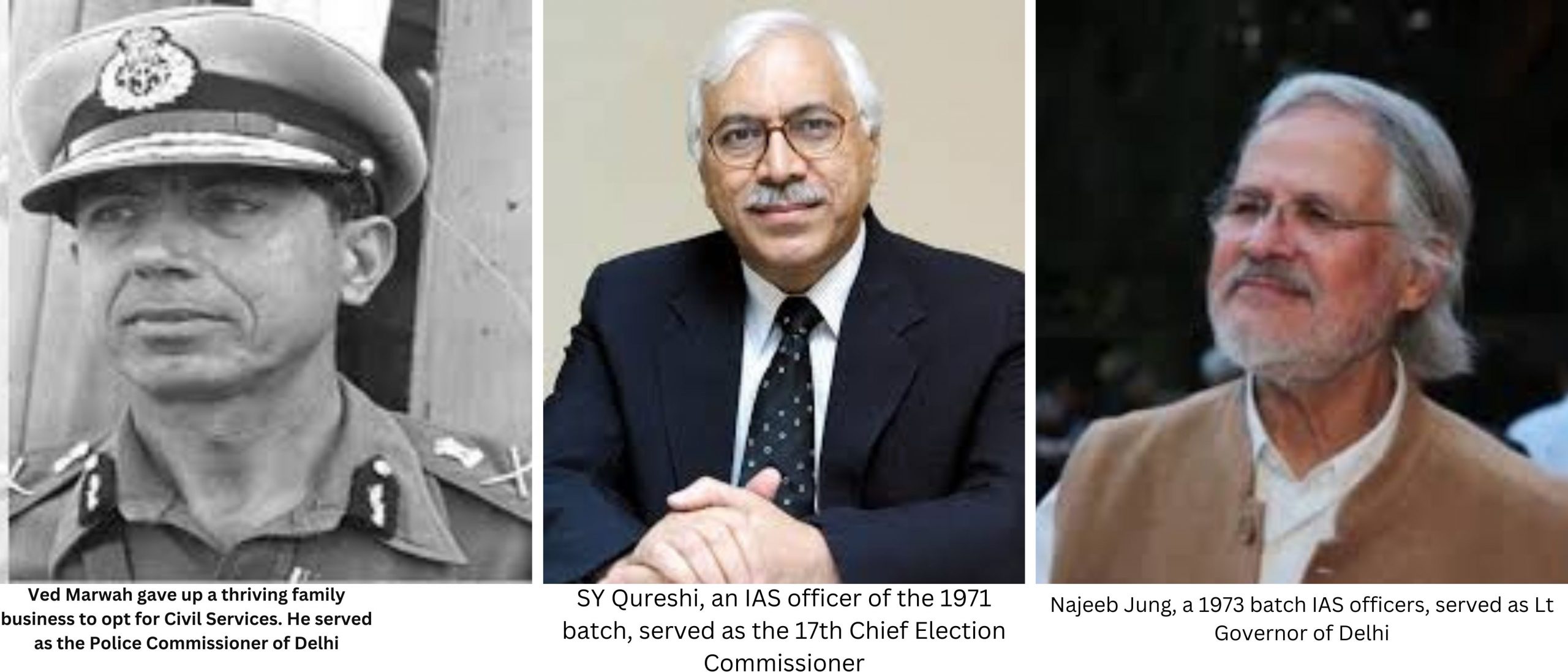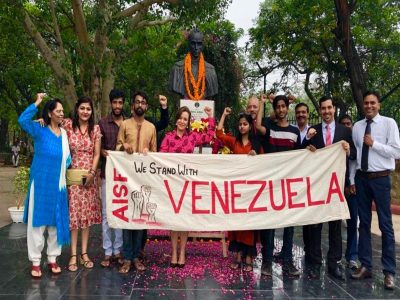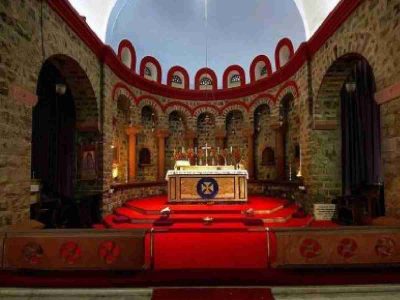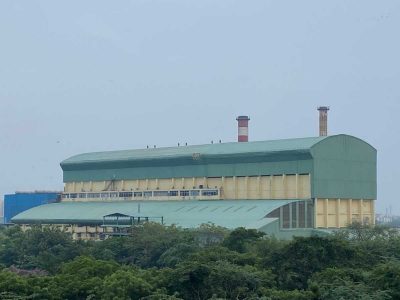Despite inheriting a fairly established bookshop ‘Faqir Chand and Sons’ at the elite Khan Market, Ved Marwah wanted to opt for a different career since the thought of sitting in the family bookstore all his life didn’t appeal to him.
He wanted to pursue a career in either academics or Civil Services after passing out from St Stephen’s College. Marwah managed to convince his father, Faqir Chand, that sitting in the shop was not his cup of tea, and he would prepare for the Union Public Service Commission (UPSC) examinations. He cracked it in his maiden attempt in 1956, opting for the elite Indian Police Service (IPS) and made a formidable reputation for himself as a tough and thinking cop.
Marwah served as the Police Commissioner of his own city, Delhi. He also served as Governor of Manipur, Mizoram and Jharkhand besides holding other key posts.
ALSO READ: How Delhi’s UPSC successes envision their work
While the UPSC doesn’t maintain such records, it is widely believed that Ved Marwah was the first individual hailing from Delhi to achieve this distinction. Although it is possible that someone from Delhi University would have cracked UPSC exams before Marwah, it is unlikely that he/she would have been a proper Dilliwala – i.e. someone who had done his schooling here.
Old timers recall that the news of Marwah clearing UPSC exams became known to everyone in Delhi as the Capital was a small city then and comprised a close-knit community where people shared each other’s joys and sorrows.
Butlarian’s journey to North Block
Career diplomat JN Dixit was also a true Delhiite. He cracked the UPSC exams in 1958. He was a student of Harcourt Butler School, Mandir Marg and Delhi College (now Zakir Husain Delhi College). His distinguished career culminated as Foreign Secretary of India and the National Security Advisor (NSA). Fluent in Tamil too, Dixit was married to the sister of former Delhi cricket team captain Venkat Sundaram.
“JN Dixit was an epitome of knowledge and grace. He also knew Tamil because his mother was Tamil,” Venkat Sundaram informs.
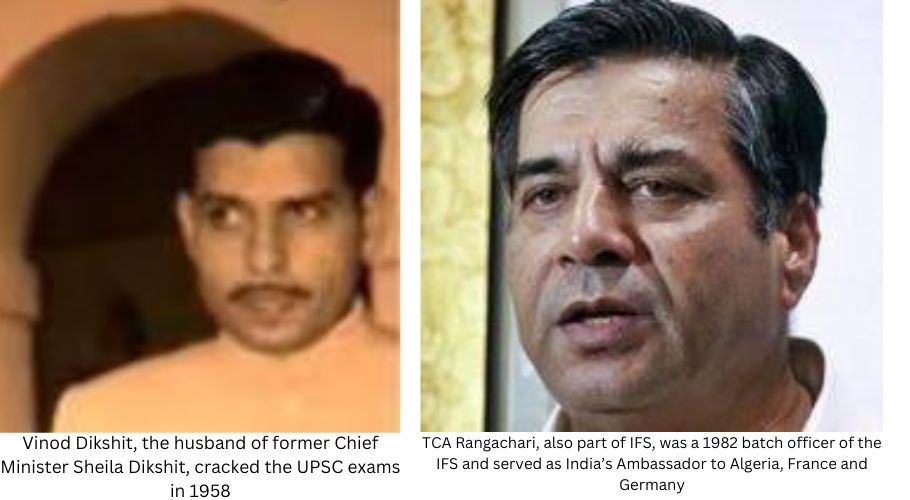
Another Dikshit had cracked the UPSC exam in 1958. That was the tall and handsome Vinod Dikshit , husband of Delhi’s longest-serving Chief Minister, Sheila Dixit. An outstanding student during his Modern School and St. Stephen’s College days, Vinod Dikshit stood 9th in the merit list. He got UP cadre. Both Vinod Dikshit and Sheila Dikshit became friends when they were in Delhi University. The late Chief Minister had once said that she was proposed by Vinod when they were travelling in DTU (now DTC) bus No. 10 during their University days.
Some people say that Natwar Singh was the first person from Delhi to clear the UPSC exams, in 1953. He later joined the Indian Foreign Service (IFS). However, he was not from Delhi. He had come here to study.
Boys from Daryaganj
Daryaganj boys have done rather well in the Civil Services exams. Raj Bhargava, an alumnus of Hindu College, was the first from the area to clear it in 1959. He also taught at his alma-mater briefly.
“Bhargava was a very fine and able civil servant in UP. He served as Chief Secretary in UP and also served as Urban Development Secretary as well as Home Secretary. He even played cricket for his college and Delhi University sides,” says veteran commentator Ravi Chaturvedi and an old friend of Bhargava.
In his fascinating book UP’s 1st Class Cricketers, Ashok Bambi, a former first-class cricketer of Uttar Pradesh, writes, “UP cricketers would always remain indebted to Raj Bhargava for developing the sports and cricket hostels in Kanpur and Lucknow. He had also served as the President of Delhi Golf Club.”
Like Bhargava, Najeeb Jung was also from Daryaganj. He joined the Indian Administrative Service (IAS) in 1973. Jung also served as the Lt Governor of Delhi. His family still owns many buildings near Golcha.
By the 1960s and 1970s, Delhi had become a well-oiled factory producing civil servants. Mani Shankar Aiyer, son of a Chartered Accountant, V. Shankar Aiyer, joined IFS in 1963 and served as Joint Secretary from 1982 to 1983 in the Ministry of External Affairs and later as Joint Secretary at Prime Minister’s Office from 1985 to 1989. He also served as a Union Minister later. Like Vinod Dikshit, he also studied at Modern School and St. Stephen’s College. It may be recalled that V. Shankar Aiyer was one of the founders of Ganesh Temple in Connaught Place. It is considered the first South Indian-style temple in the Capital.
Hard yards pay off
If Ved Marwah was not interested in sitting in his family shop, TR Kakkar, who was the Delhi Police Commissioner in 1997, had to work part time in a small shop in Kamla Nagar due to tough financial conditions of his family in the early 1950s.
“After attending classes in a government school in Guru Teg Bahadur Nagar (GTB Nagar), I used to work in a shop in Kamala Nagar. That shop is still there,” he once recalled when he was visiting his alma-mater. He cracked the UPSC exam in 1964. He also headed the National Security Guard (NSG).
Pravin Kumar, who cracked the UPSC exam in 2000, is also a product of a government school in Delhi. A Punjab cadre officer, Kumar was a student of Sarvodaya Bal Vidyalaya (earlier MC School).
Naveen Chawla is also a son of the soil. He joined the IAS in 1969 and rose to the highest rank of Secretary to the Government of India. Deeply influenced by Mother Teresa, he wrote her best-selling biography (translated into 14 languages and called Mother Teresa). Almost half a million copies have already been sold. Substantial royalties have been donated to the cause of leprosy. Because of her influence, he has set up two NGOs which provide free medicines to leprosy patients.
Diplomats from Hindu College
Hardeep Puri, an alumnus of the Frank Anthony Public School and Hindu College, joined the IFS in 1974. Now serving as Union Minister in the NDA government, he also served as India’s Permanent Representative to the United Nations from 2009 to 2013.
TCA Rangachari, also part of IFS, is a proud Dilliwala and a Hinduite. He was a 1982 batch officer of the IFS and served as India’s Ambassador to Algeria, France and Germany. He also spent over five years in Islamabad, Pakistan, as Deputy High Commissioner. He is currently the head of the Hindu College Governing Body.
Meira Kumar, who was Speaker of the Lok Sabha, achieved success in the UPSC examinations in 1973. She studied at the Miranda House. Daughter of Babu Jagjivan Ram, Meira completed her schooling in Delhi.
She was also elected to the Lok Sabha from Karol Bagh in 1996. Renowned author Pawan Varma was also an IFS officer of the 1976 batch. He earned a degree in history from St Stephen’s College and also studied at the Faculty of Law, University of Delhi. He has done seminal research work on Mirza Ghalib.
First Muslim CEC
SY Qureshi, an IAS officer of the 1971 batch from Haryana cadre, served as 17th Chief Election Commissioner (CEC) of India. He succeeded Navin Chawla on July 30, 2010. He also served as Chairman of the Modern School Governing Body. Qureshi became the first member of the Muslim community to serve as the CEC of India and demitted office on June 10, 2012. His brother Aziz is an accomplished theatre personality and has played for India in football.
Union External Affairs Minister S. Jaishankar is from Air Force School, Dhaula Kuan. He passed the UPSC exam in 1977. His father, S. Subrahmanyam, was a 1950 batch IAS officer who had topped the UPSC examination while living in the then Madras. He was only 21 years old then. He was an expert on International and Strategic affairs.
Once Jawaharlal Nehru University was established in the Capital in 1970s, Delhi started producing many, many more civil servants. However, they were not all true-blue Delhiites.

